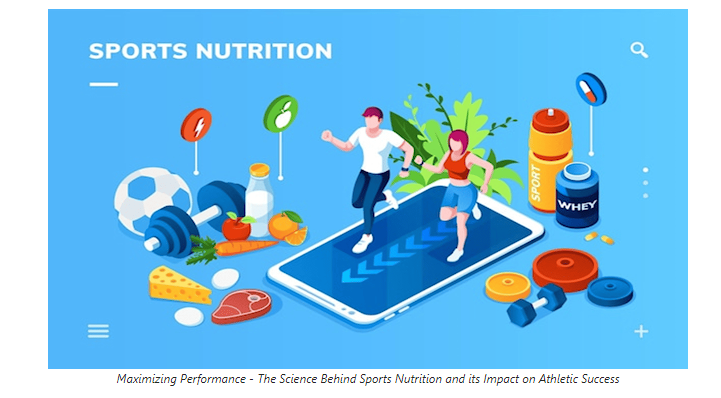Introduction to Sports Nutrition
Sports nutrition plays a crucial role in boosting athletic performance. As an athlete, I’ve come to appreciate how essential sports nutrition is for fueling my body with the right nutrients to enhance my training and achieve my goals. This comprehensive guide will delve into the science behind sports nutrition and its significant influence on an athlete’s success. By understanding and applying effective sports nutrition strategies, athletes can maximize their potential and improve their overall performance.

Maximizing Performance – The Science Behind Sports Nutrition and Its Impact on Athletic Success
The foundation of success in sports lies in good nutrition. Athletes must maintain a balanced diet to meet energy demands, expedite recovery, and bolster overall health. Proper nutrition not only fuels training sessions and competitions but also fortifies against injuries and bolsters immune function.
Sports Nutrition: Why It’s Crucial
The cornerstone of athletic triumph is laid by good nutrition. In order to achieve peak performance, athletes must ensure their diets are rich in macronutrients like carbohydrates, proteins, fats, as well as micronutrients like vitamins and minerals. Carbohydrates serve as the primary energy source, while proteins aid in muscle growth and repair, and fats provide sustained energy. Vitamins and minerals are indispensable for various physiological functions.
Understanding Macronutrients and Micronutrients
Macronutrients, comprising carbohydrates, proteins, and fats, are essential in larger quantities to fuel physical activity and support muscle development. Conversely, micronutrients such as vitamins and minerals, though needed in smaller amounts, are equally critical for optimal health and performance, influencing energy metabolism, immune function, and other bodily processes.
Pre-Workout Fuel: Ensuring Success
Proper pre-workout nutrition is imperative for maximizing performance and staving off fatigue during training or competitions. Athletes should consume a balanced meal or snack rich in carbohydrates and proteins approximately 2-3 hours before physical activity. This allows for efficient digestion and absorption, providing a sustained energy source throughout the workout. Hydration before exercise is equally vital for maintaining peak performance.
Hydration: The Importance of Water Intake for Athletes
Hydration often takes a back seat but remains a crucial aspect of sports nutrition. Dehydration can lead to diminished performance, muscle cramps, and increased susceptibility to heat-related illnesses. Athletes should aim to stay hydrated by regularly drinking water throughout the day and increasing fluid intake during intense physical activity. Monitoring urine color can serve as a useful gauge of hydration status.
Post-Workout Nutrition: Optimizing Recovery
Post-workout nutrition is paramount for facilitating recovery and promoting muscle repair. Consuming a blend of carbohydrates and proteins within 30 minutes to an hour after exercise aids in replenishing glycogen stores and stimulating muscle protein synthesis. This can be achieved through a balanced meal or a protein shake. Additionally, incorporating antioxidant-rich foods like fruits and vegetables aids in reducing inflammation and expediting recovery.
Supplements: Their Role in Sports Nutrition
While the majority of nutrients should ideally come from a balanced diet, supplements can be beneficial for athletes with specific dietary restrictions or heightened nutrient needs. However, caution must be exercised, and consultation with a healthcare professional or sports nutritionist is advisable to identify individual requirements. Common supplements for athletes include protein powders, creatine, omega-3 fatty acids, and multivitamins.
Meal Examples for Athletes
Crafting a meal plan tailored to an athlete’s needs may seem daunting, but it’s essential for optimal performance. A well-balanced meal plan should encompass a variety of whole foods that deliver the necessary nutrients. For instance:
- Breakfast: Oatmeal with berries and a side of Greek yogurt.
- Lunch: Grilled chicken breast with quinoa and roasted vegetables.
- Snack: Apple slices with almond butter.
- Post-Workout Snack: Protein shake with a banana.
- Dinner: Salmon with sweet potato and steamed broccoli.
- Evening Snack: Greek yogurt and mixed nuts.
Best Foods for Athletes: Incorporating Them into Your Diet
Incorporating nutrient-dense foods into an athlete’s diet is paramount for maximizing performance. Lean meats, whole grains, fruits, vegetables, nuts, and seeds constitute some of the best foods for athletes. Lean meats provide high-quality protein, while whole grains offer sustained energy. Fruits and vegetables are rich in vitamins, minerals, and antioxidants, supporting overall health and recovery. Nuts and seeds serve as excellent sources of healthy fats and convenient snack options.
The Impact of Nutrition on Athletic Success
The significance of nutrition in athletic success cannot be overstated. Proper nutrition not only fuels the body but also enhances strength, endurance, and recovery. A well-balanced diet tailored to individual needs can lead to improved performance, reduced injury risk, and better overall health. Prioritizing nutrition and seeking guidance from qualified professionals are essential steps in maximizing athletic potential.
Sports Nutrition Resources: Books, Blogs, and Experts
Athletes seeking to expand their knowledge of sports nutrition can explore various resources. Books like “Sports Nutrition: A Handbook for Professionals” by Christine Rosenbloom and blogs such as “Precision Nutrition” offer valuable insights and practical advice. Additionally, consulting with a registered dietitian specializing in sports nutrition can provide personalized guidance and support.
Conclusion: The Key to Maximizing Performance Through Nutrition
In conclusion, sports nutrition is a science that significantly impacts athletic performance. By understanding the importance of key nutrients, adhering to proper pre- and post-workout nutrition, maintaining hydration, and incorporating nutrient-dense foods into their diets, athletes can optimize their training and achieve their goals. Remember, nutrition is the key to unlocking your full potential as an athlete.

CTA: For athletes aiming to elevate their performance, consider consulting with a registered dietitian specializing in sports nutrition. They can offer personalized guidance and help devise a nutrition plan tailored to your specific needs and goals.


